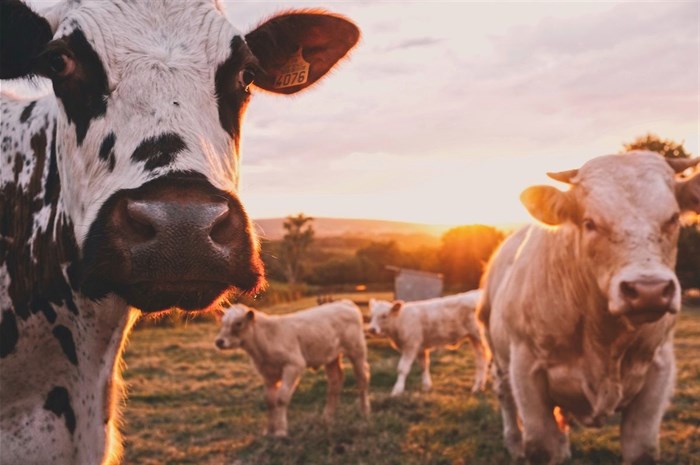Partnership beefs up veterinary services across Africa, Asia and Middle East to tackle animal disease
3,266 vets in Asia, 619 in West Africa, and 363 in the Middle East benefitted. They are on the front line of the effort to stop new diseases at their source.

It's not just a global health, infectious disease issue, but also a food security, food safety, and economic growth issue.
Pre-empting future pandemics
"Over the course of this relationship we've learned that there are many mutually beneficial areas of interest between the food and agricultural community and the human health community," said Dennis Carroll, director of USAID's Global Health Security and Development Unit.
"A partnership with FAO not only enables us to protect human populations from future viral threats but also to protect animal populations from viruses that could decimate food supplies. It's not just a global health, infectious disease issue, but also a food security, food safety, and economic growth issue," Carroll added.
"Some 75 of new infectious diseases that have emerged in recent decades originated in animals before jumping to us Homo sapiens, a terrestrial mammal. This is why improving adequately discovering and tackling animal disease threats at source represents a strategic high-ground in pre-empting future pandemics," said Juan Lubroth, FAO chief veterinary officer
"A proactive approach is absolutely critical, and for that, the world needs well-trained, up-to-speed professionals — biologists, ecologists, microbiologists, modellers, physicians and veterinarians - which is why the United States' consistent support for building up that kind of capacity has been invaluable," Lubroth said.
Viral risks
Population growth, agricultural expansion and environmental encroachment, and the rise of inter-continental food supply chains in recent decades have dramatically altered how diseases emerge, jump species boundaries, and spread, FAO studies have shown.
A new study just published by Carroll and experts from several institutions including FAO suggests that just 0.01% of the viruses behind zoonotic disease outbreaks are known to science. The authors have proposed an international partnership, The Global Virome Project, aimed at characterising the riskiest of these. Doing so would allow more proactive responses to disease threats, with benefits not only for public health but also for the livelihoods of poor, livestock-depending farming communities.
Economic impacts as well as health consequences
Beyond the risks posed to human health, animal diseases can cost billions of dollars and hamstring economic growth.
The most damaging outbreaks of high impact disease in recent decades all had an animal source, including H5N1 highly pathogenic avian influenza, H1N1 pandemic influenza, Ebola, severe acute respiratory syndrome (SARS) and Middle East Respiratory Syndrome (MERS).
For example, the H5N1 outbreak of the mid-2000s caused an estimated $30bn in economic losses, globally. A few years later, H1N1 racked up as much as $55bn in damages.
Not to mention that for millions of the world's poorest people, animals are their primary capital assets — "equity on four legs". Losing them can push these families out of self-reliance and into destitution.
Partnering for global health security
The close FAO-USAID partnership on animal health goes back over a decade.
In addition to training via the USAID- Emerging Pandemic Threats (EPT) programme, FAO conducts research and advises on policy in order to help countries increase their resilience to disease emergence and protect animal and human health.
To enable rapid responses by governments to disease events, FAO has leveraged USAID support to work with the United Nations Humanitarian Response Depots to establish a series of emergency equipment and gear stockpiles in 15 countries that facilitate rapid and adequate responses to outbreaks.
FAO is also key player and advisor to the Global Health Security Agenda (GHSA), a growing partnership of over 60 countries, NGOs and international organisations working to improve early detection of and responses to infectious disease threats. USAID support under the GHSA umbrella is helping FAO engage with 17 countries in Africa and Asia to strengthen capabilities to detect and respond to zoonotic diseases.
Thanks to USAID support for the EPT and GSHA, FAO is actively tackling disease issues and building national capacities in over 30 countries
The countries where training took place were: Bangladesh, Burkina Faso, Cambodia, Cameroon, China, Democratic Republic of the Congo, Egypt, Ghana, Guinea, Indonesia, Jordan, Kenya, Laos People's Democratic Republic , Liberia, Mali, Myanmar, Nepal, Senegal, Sierra Leone, United Republic of Tanzania, Uganda and Viet Nam.
Related
#Budget2025: Pushback over Fikile's D-Day announcement 8 Apr 2025 Kenya HIV patients live in fear as US aid freeze strands drugs in warehouse 13 Mar 2025 US withdraws from Just Energy Transition partnership with SA 10 Mar 2025 No-shows, aid cuts mar G20 meet on global poverty 27 Feb 2025 New Plant Health Act to boost agricultural trade and biosecurity 17 Feb 2025 USAID workforce reduced by 97% 7 Feb 2025






















